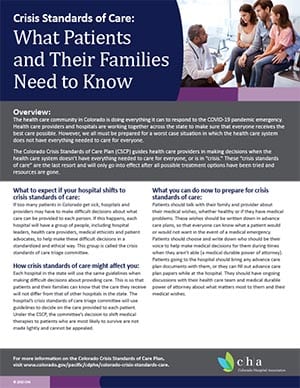Overview:
The health care community in Colorado is doing everything it can to respond to the COVID-19 pandemic emergency. Health care providers and hospitals are working together across the state to make sure that everyone receives the best care possible. However, we all must be prepared for a worst case situation in which the health care system does not have everything needed to care for everyone.
The Colorado Crisis Standards of Care Plan (CSCP) guides health care providers in making decisions when the health care system doesn’t have everything needed to care for everyone, or is in “crisis.” These “crisis standards of care” are the last resort and will only go into effect after all possible treatment options have been tried and resources are gone.
What to expect if your hospital shifts to crisis standards of care:
If too many patients in Colorado get sick, hospitals and providers may have to make difficult decisions about what care can be provided to each person. If this happens, each hospital will have a group of people, including hospital leaders, health care providers, medical ethicists and patient advocates, to help make these difficult decisions in a standardized and ethical way. This group is called the crisis standards of care triage committee.
How crisis standards of care might affect you:
Each hospital in the state will use the same guidelines when making difficult decisions about providing care. This is so that patients and their families can know that the care they receive will not differ from that of other hospitals in the state. The hospital’s crisis standards of care triage committee will use guidelines to decide on the care provided to each patient. Under the CSCP, the committee’s decision to shift medical therapies to patients who are most likely to survive are not made lightly and cannot be appealed.
What you can do now to prepare for crisis standards of care:
Patients should talk with their family and provider about their medical wishes, whether healthy or if they have medical problems. These wishes should be written down in advance care plans, so that everyone can know what a patient would or would not want in the event of a medical emergency. Patients should choose and write down who should be their voice to help make medical decisions for them during times when they aren’t able (a medical durable power of attorney). Patients going to the hospital should bring any advance care plan documents with them, or they can fill out advance care plan papers while at the hospital. They should have ongoing discussions with their health care team and medical durable power of attorney about what matters most to them and their medical





